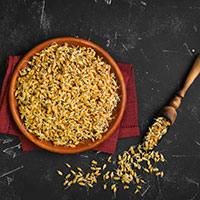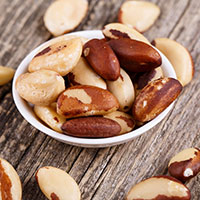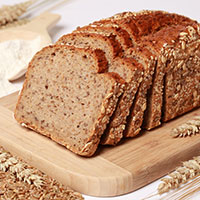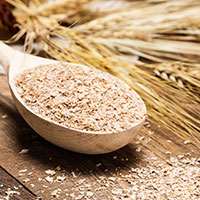| Mineral name |
Selenium |
| What’s it used for? | Immunity; protection from age-related degenerative diseases |
| Best food sources | Brazil nuts, whole wheat foods, brown rice, oats and turnips |
| How much do I need? | NRV is 55ug per day* |
| Need to know | Selenium levels in plant-based foods are directly related to levels in the soil |
*A Nutrient Reference Value or NRV is the recommended level set by the UK Department of Health for daily nutrient intake
Selenium
Selenium is an essential trace mineral needed in small daily amounts. Its main function is as part of the body’s most powerful antioxidant enzyme. This enzyme reaction helps protect the body from free radical damage, which is, in part, responsible for the ageing process. It could therefore be known as the ‘mineral of youth’!
Why do I need it?
Whilst selenium is essential for protecting body cells and membranes from free radical damage, it also works very closely with vitamin E. These two powerful nutrients together carry out antioxidant and immune-boosting functions.
Selenium also works well alongside other antioxidants such as zinc, beta-carotene and vitamin C It also appears to be helpful in moderating conditions where inflammation is present, such as rheumatoid arthritis.
Selenium levels are generally low in Western diets due to depleted levels in the soils. The tendency towards eating refined foods also means a generally reduced intake of selenium; it is lost during processing in foods such as white rice or white flour.
Selenium is key for healthy sperm production, hence its role in reproductive health, and is needed for efficient thyroid hormone production and function.
Best food sources
Whole wheat foods provide some of the best sources; wheat germ is an excellent source of selenium. Generally plant-based foods provide the highest amounts where the soil is rich in minerals.
Five foods high in selenium

Wheat germ – 111ug per 100g

Brazil nuts – 103ug per 100g

Whole-wheat bread – 66g per 100g

Bran – 63mg per 100g

Oats – 56ug per 100g
Are you getting enough?
Although only needed in trace amounts, a marginal deficiency of selenium is often noted, due to depleted intake and low-mineral soils. This can result in poor immunity, a greater susceptibility to degenerative diseases, inflammatory problems, reduced male fertility and contributes to skin conditions such as eczema.
Did you know?
Selenium is safe to take during pregnancy and breastfeeding at recommended dosages – consult your healthcare professional for adviceDespite its importance there is still less than 1 mg stored in the body, mainly in the testicles, liver and kidneys
Selenium supplementation is used for general antioxidant support
For all the latest research on selenium click here
Try this
Selenium is found in the Alive! range of multi vitamins and minerals.
For more information visit www.feelaliveuk.com
You can also follow Alive! on Twitter for general health and wellbeing tips: @feelaliveuk


